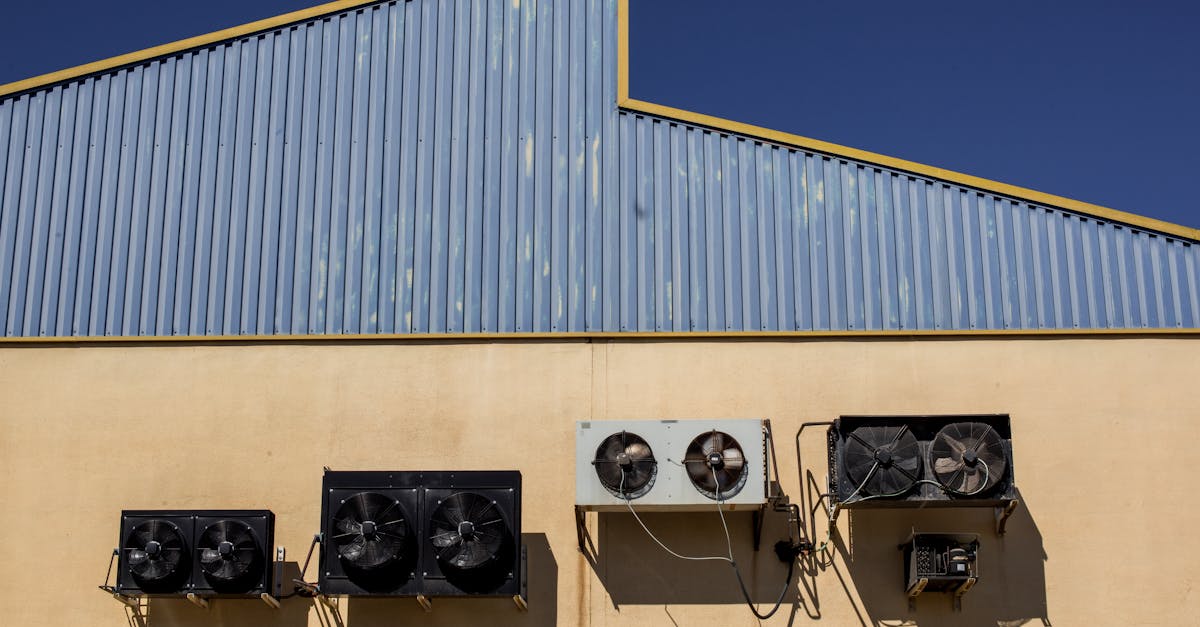Addressing Short Cycling Problems in Commercial HVAC Solutions

Table Of Contents
Preventive Measures for Short Cycling
Regularly monitoring system settings can significantly reduce the likelihood of short cycling in HVAC systems. Ensure that the thermostat is set to an appropriate temperature range. An overly ambitious temperature setting can cause the system to turn on and off frequently, leading to inefficient operation and increased wear on components.
Another effective preventive measure involves ensuring proper airflow throughout the system. This can be achieved by cleaning or replacing air filters on a consistent basis. Blocked filters restrict airflow and can trigger the system to cycle more often, as it works harder to maintain the desired climate. Regular inspections of ducts for any obstructions will also help in maintaining optimal airflow.
Best Practices to Avoid Recurrent Cycling Issues
To minimise the risk of short cycling in commercial HVAC systems, it is essential to maintain proper thermostat settings. Setting the thermostat at a reasonable temperature prevents frequent on-and-off cycles. Avoiding extreme temperature changes can help maintain system stability and efficiency. Additionally, placing the thermostat in an ideal location away from direct sunlight and drafts ensures accurate temperature readings.
Regular inspection of air filters plays a crucial role in system performance. Clogged or dirty filters restrict airflow, leading to overheating and subsequent short cycling. Regularly replacing or cleaning filters will promote adequate airflow and help maintain optimal temperatures. Furthermore, ensuring that supply and return vents are unobstructed contributes significantly to the overall efficiency of the HVAC system.
Repair Options for Short Cycling Problems
Identifying the underlying cause of short cycling is crucial for determining the appropriate repair. If issues stem from a faulty thermostat, replacing or recalibrating the thermostat can significantly improve performance. In cases where the problem lies in refrigerant levels, recharging or fixing leaks may be necessary. Additionally, inspecting and cleaning the coils can enhance the unit’s efficiency, reducing the likelihood of cycling issues.
Sometimes, more complex problems require attention from experienced technicians. For example, electrical issues within the system can disrupt normal functioning. In this scenario, a thorough examination by a qualified professional can ensure all components are operating correctly. Addressing ductwork problems, such as leaks or blockages, may also be vital for restoring the system’s efficiency and preventing future occurrences of short cycling.
When to Seek Professional Help for Your HVAC System
Identifying issues within your HVAC system can sometimes be straightforward, such as noticing that the unit is cycling too frequently. However, more subtle signs may indicate deeper problems requiring professional expertise. If you find that your system struggles to maintain the set temperature despite regular settings adjustments, or if unusual noises have become commonplace, it is crucial to consult a technician promptly. Addressing these concerns early can mitigate potential damage and enhance system longevity.
Additionally, a persistent increase in energy bills might signal inefficiencies within your HVAC system. If you have already implemented preventive measures yet continue to experience short cycling, seeking professional assistance is wise. Specialized technicians possess the knowledge to diagnose and rectify underlying issues effectively. Their expertise can ensure your system operates smoothly, providing the comfort you need in your commercial environment.
The Role of Regular Maintenance
Regular maintenance plays a crucial role in ensuring the efficiency of HVAC systems. Scheduled inspections and servicing can significantly reduce the likelihood of short cycling. Technicians can identify underlying issues that may lead to this problem, such as refrigerant leaks or faulty thermostats. Addressing these concerns promptly can enhance system performance and prolong the unit's lifespan.
Routine maintenance tasks, such as cleaning filters and coils, also contribute to optimal airflow and temperature regulation. When air filters are clean, the system operates more effectively, reducing the strain on components. This not only minimises the chances of short cycling but also improves energy efficiency. Regular check-ups conducted by qualified technicians can help maintain a comfortable indoor environment while safeguarding against unexpected breakdowns.
How Routine Checks Can Prevent Short Cycling
Regular maintenance of HVAC systems plays a vital role in reducing the likelihood of short cycling. Technicians can identify and rectify minor issues during routine inspections. They can check for airflow blockages in ducts that might impede the system's ability to operate efficiently. Ensuring refrigerant levels are adequate is another critical aspect, as low levels can prompt compressors to shut down prematurely to protect themselves from damage.
Moreover, these checks help assess the thermostat's accuracy. A malfunctioning thermostat often leads to miscommunication between the system and the desired temperature settings. By calibrating or replacing faulty thermostats, technicians can prevent unnecessary on-and-off cycles. Regular maintenance not only enhances system longevity but also optimises energy consumption, providing a dual benefit for businesses reliant on effective climate control.
FAQS
What is short cycling in HVAC systems?
Short cycling refers to the frequent and rapid on-and-off operation of an HVAC system, which can lead to inefficiency, increased energy costs, and wear and tear on the unit.
What are some common causes of short cycling in commercial HVAC systems?
Common causes include oversized equipment, thermostat issues, clogged air filters, refrigerant problems, and faulty sensors.
How can I prevent short cycling in my HVAC system?
Preventive measures include ensuring proper system sizing, regularly changing air filters, scheduling routine maintenance, and monitoring thermostat settings for accuracy.
When should I seek professional help for short cycling issues?
You should seek professional help when short cycling persists despite preventive measures, when there are unusual noises or smells from the system, or if you notice significant energy cost increases.
What role does regular maintenance play in preventing short cycling?
Regular maintenance helps identify and rectify potential issues before they escalate, ensuring that the HVAC system operates efficiently and reducing the risk of short cycling.
Related Links
Troubleshooting Inefficient Cooling Performance in HVAC SystemsIdentifying and Rectifying Excessive Noise in HVAC Units
Strategies for Overcoming Electrical Component Failures in HVAC
Managing and Eliminating Indoor Air Quality Issues in HVAC
Effective Methods for Preventing Condensate Drain Blockages